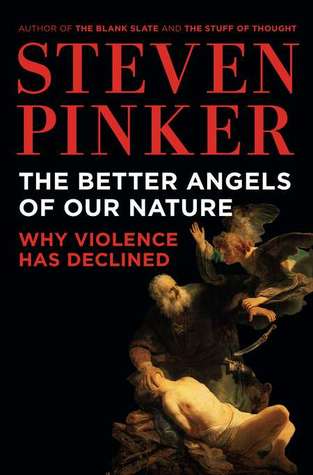States Reduce Violence
So did Hobbes get it right? In part, he did. In the nature of man we find three principal causes of quarrel: gain (predatory raids), safety (preemptive raids), and reputation (retaliatory raids). And the numbers confirm that relatively speaking, “during the time men live without a common power to keep them all in awe, they are in that condition which is called war,” and that in such condition they live in “continual fear, and danger of violent death.”
But from his armchair in 17th-century England, Hobbes could not help but get a lot of it wrong. People in nonstate societies cooperate extensively with their kin and allies, so life for them is far from “solitary,” and only intermittently is it nasty and brutish. Even if they are drawn into raids and battles every few years, that leaves a lot of time for foraging, feasting, singing, storytelling, childrearing, tending to the sick, and the other necessities and pleasures of life. In a draft of a previous book, I casually referred to the Yanomamö as “the fierce people,” alluding to the title of the famous book by the anthropologist Napoleon Chagnon. An anthropologist colleague wrote in the margin: “Are the babies fierce? Are the old women fierce? Do they eat fiercely?”
As for their lives being “poor,” the story is mixed. Certainly societies without an organized state enjoy “no commodious building; no instruments of moving and removing such things as require much force; no knowledge of the face of the earth; no account of time, [and] no letters,” since it’s hard to develop these things if the warriors from the next village keep waking you up with poisoned arrows, abducting the women, and burning your huts. But the first peoples who gave up hunting and gathering for settled agriculture struck a hard bargain for themselves. Spending your days behind a plow, subsisting on starchy cereal grains, and living cheek by jowl with livestock and thousands of other people can be hazardous to your health. Studies of skeletons by Steckel and his colleagues show that compared to hunter-gatherers, the first city dwellers were anemic, infected, tooth-decayed, and almost two and a half inches shorter.78 Some biblical scholars believe that the story of the fall from the Garden of Eden was a cultural memory of the transition from foraging to agriculture: “In the sweat of thy face shalt thou eat bread.”
So why did our foraging ancestors leave Eden? For many, it was never an explicit choice: they had multiplied themselves into a Malthusian trap in which the fat of the land could no longer support them, and they had to grow their food themselves. The states emerged only later, and the foragers who lived at their frontiers could either be absorbed into them or hold out in their old way of life. For those who had the choice, Eden may have been just too dangerous. A few cavities, the odd abscess, and a couple of inches in height were a small price to pay for a fivefold better chance of not getting speared.
Notes:
Folksonomies: society governance violence
Taxonomies:
/food and drink (0.468805)
/home and garden (0.415291)
/sports/martial arts (0.376347)
Keywords:
anthropologist Napoleon Chagnon (0.869648 (neutral:0.000000)), States Reduce Violence (0.868555 (neutral:0.000000)), starchy cereal grains (0.836268 (negative:-0.470377)), fivefold better chance (0.819277 (neutral:0.000000)), thy face shalt (0.809413 (neutral:0.000000)), retaliatory raids (0.791360 (negative:-0.602663)), fierce people (0.730221 (negative:-0.373149)), anthropologist colleague (0.711875 (neutral:0.000000)), principal causes (0.700422 (negative:-0.359032)), 17th-century England (0.699632 (neutral:0.000000)), foraging ancestors (0.699286 (negative:-0.604168)), continual fear (0.695895 (negative:-0.607419)), common power (0.693772 (neutral:0.000000)), time men (0.693293 (neutral:0.000000)), violent death (0.693045 (negative:-0.724951)), old women (0.685372 (negative:-0.511526)), nonstate societies (0.684509 (neutral:0.000000)), previous book (0.682115 (neutral:0.000000)), famous book (0.681329 (neutral:0.000000)), half inches (0.678901 (neutral:0.000000)), city dwellers (0.678467 (negative:-0.595958)), odd abscess (0.678152 (negative:-0.548615)), hard bargain (0.677860 (negative:-0.294024)), commodious building (0.677595 (negative:-0.329165)), Malthusian trap (0.676027 (negative:-0.461305)), state enjoy (0.672988 (neutral:0.000000)), old way (0.668966 (neutral:0.000000)), cultural memory (0.668942 (neutral:0.000000))
Entities:
Hobbes:Person (0.839499 (negative:-0.479898)), Eden:Person (0.824492 (negative:-0.443867)), Garden of Eden:Facility (0.629281 (neutral:0.000000)), Napoleon Chagnon:Person (0.597321 (neutral:0.000000)), principal:JobTitle (0.552009 (negative:-0.359032)), nonstate:City (0.526461 (neutral:0.000000)), England:Country (0.519825 (neutral:0.000000)), Steckel:Person (0.515960 (negative:-0.348923)), Yanomamö:City (0.510640 (neutral:0.000000))
Concepts:
Cereal (0.887035): dbpedia | freebase
Garden of Eden (0.781777): dbpedia | freebase | yago
Foraging (0.780271): dbpedia | freebase | opencyc
Napoleon Chagnon (0.738623): dbpedia | freebase | yago
Malthusian catastrophe (0.730192): dbpedia | freebase | yago
17th century (0.726294): dbpedia | freebase | yago
Cheek by Jowl (0.723126): dbpedia | freebase | yago
Declan Donnellan (0.707473): website | dbpedia | freebase | yago





